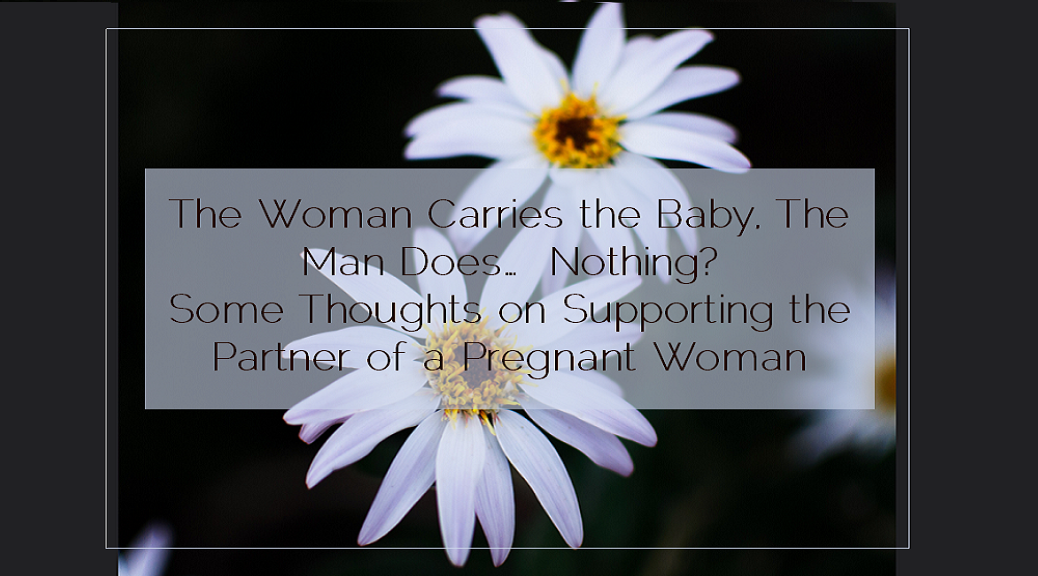Something has been troubling me over the last couple of years and, now that I am living through the experience of being pregnant, it’s hitting home hard.
While it’s true that physically, I am carrying our child, the emotional, mental, and spiritual weight of the responsibility is not only on my shoulders. Even a good portion of the physical aspect of pregnancy is something that isn’t only mine to carry.
From the very beginning of this process—which began when we started reflecting on our potential role, some time in the future, as parents—my husband has been an integral part of it. And while he doesn’t have the symptoms, the aches, and the pains associated with carrying a baby, these and more have taken a toll on him as well.
After all, he has been just as assiduous about eating habits (if not more… how many a chocolate bar has he saved the baby and I from!), about exercising, about praying more, about meditating, about stretching, about preparing for the little one’s arrival, etc. There isn’t a single thing I have done for the little one he hasn’t accompanied me in. When the pregnancy affects me physically, he both helps take care of me while taking on as many of my life responsibilities as he can.
And yet, the overwhelming majority of people offer encouragement, love, and support only to me.
But guys… My husband is also tired. He is also concerned. He is also going through a huge emotional, spiritual, and mental shift. While I deeply and profoundly appreciate the love, support, help, and encouragement I have been getting, I worry a lot about my partner’s well-being, all the more that he is relatively so alone in this process.
I didn’t know if this was something unique to my husband or that if my gut feeling has been right all these years: that this isolation is something more common that we realise. So I reached out on various online forums as well as to friends of mine. Most women overwhelmingly agreed that it was a big, painful struggle for them to make sure their husbands were getting the support, love, and encouragement they needed during this time of their lives.
I am going to make a bit of a leap here, but please bear with me.
What if this situation is related to the current nature of conversations about gender issues: they are, put crudely, more often about man-bashing than about figuring out how men and women can work in all aspects of society as equals. Viewed through this lens, we focus on what men don’t do during a pregnancy and punish them for it.
But this is wrong for a very simple reason. While there are men out there who are, well, not the nicest people (to put it mildly), most men are kind, thoughtful, and, when they realise what women are going through, want to correct the situation.
Similarly, there are men who are not kind to their pregnant counterparts. But most men really stand up to the challenge during their partner’s pregnancy. And, to cast a wider net, most men, when given the chance, stand up to the challenge during a friend’s pregnancy. I recently told one of my male friends about how the various aches that pregnancy creates; since then, he has been reading up on it and sending me and another pregnant friend links about what we can do to alleviate some of it. It might not seem like a lot, but it’s already a lot more than he was doing, and he did it of his own volition as soon as he realised that pregnancy was a lot more than carrying extra weight.
What I am going to personally do about all of this? I am going to begin by trying even harder to not get caught in the “men are horrible” discourse. I think the good men of today have suffered enough because of the mistakes of the terrible men of the past and the less-than-ideal men of today. Let’s stop punishing these gems further by taking steps to share our concerns and challenges with them, and let them surprise us again and again by how far they will go to make significant changes.
Another thing I will continue doing is to not only ask a pregnant woman about her well-being and that of her little one; I will make sure to continue asking about that of her partner’s, and even, if possible, take the time to talk to him about how he is doing and what support he needs. After all, a pregnancy is about both the woman and the man; let’s start supporting them both equally.

